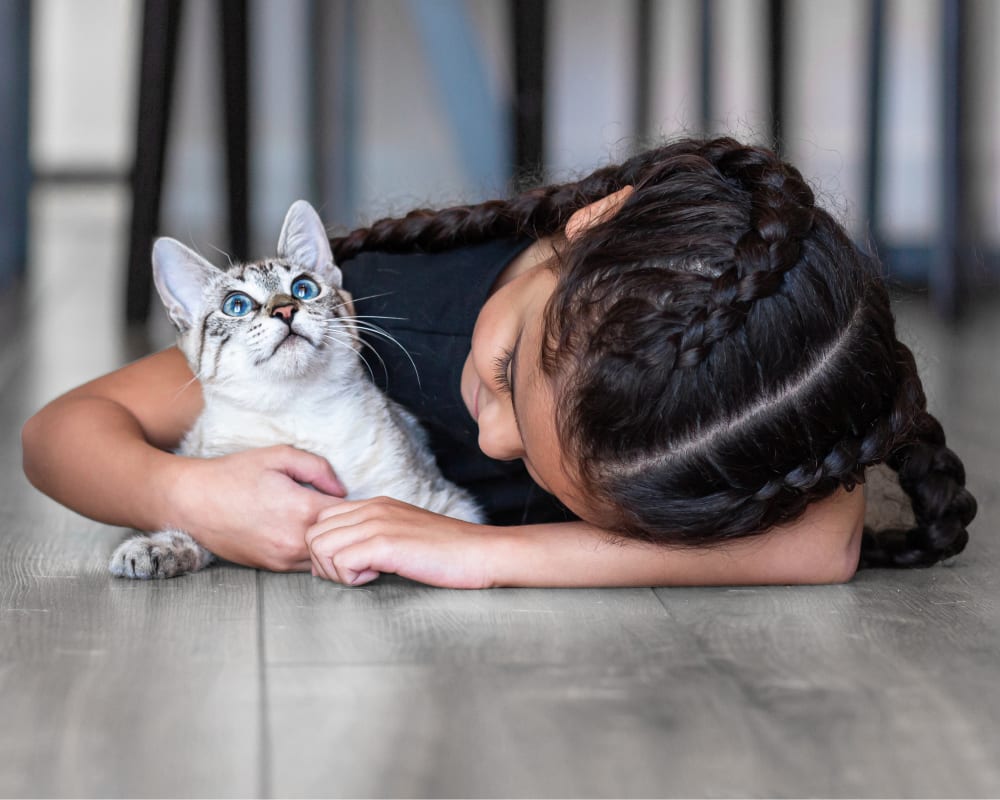Reproductive Surgeries to Help Cats & Dogs Live Healthier Lives
At Northside Veterinary Clinic, the spaying and neutering procedures that we perform help prevent the birth of unwanted kittens and puppies at a time when shelters across the country are already over capacity.
Along with the benefits to society, these reproductive surgeries can help reduce the risk of your cat or dog developing serious and potentially life-threatening diseases. Along with preventing medical conditions, spaying and neutering may also assist with the reduction of behavioural issues like aggression.
Our veterinarians perform these procedures regularly to help Lethbridge pets live healthier, more content lives. We do everything we can during the appointment to keep your furry friend comfortable and will provide you with everything you need for post-operative care once back at home.

Neutering (Males)
Neutering, or orchiectomy, is a surgical procedure where the testicles are removed from male pets. This will result in their inability to father puppies or kittens. Some additional benefits of neutering cats and dogs include:
Cats - Neutering your cat can help to curb undesirable behaviours such as spraying, roaming and aggression towards other cats.
Dogs - Neutering your dog may help to reduce animal aggression, 'humping' and attempts at escaping your home or yard.
Spaying (Females)
Spaying, technically known as an ovariohysterectomy, removes a female pet's reproductive organs. Your female cat or dog will no longer be able to become pregnant once they are spayed. Other benefits of spaying cats and dogs are:
Cats - Spaying your cat may help prevent them from escaping your home, roaming, yowling and urinating inappropriately.
Dogs - Having your female dog spayed ends their heat cycle and helps prevent pyometra (womb infection) and mammary tumours.
When Should You Spay or Neuter Your Pet?
After you, your veterinarian is the person who knows your pet best. Although we provide general spay and neuter age guidelines below, it is always best to consult your pet's veterinarian for advice.
Cats
Kittens can be spayed or neutered as young as six to eight weeks of age. However, standard spay and neuter surgeries are most often performed when the kitten is between five and six months old. Even so, it is possible to spay or neuter any healthy adult cat.
Dogs
Traditionally puppies have been spayed or neutered at around six months old. While this is a common age, many veterinarians recommend waiting until your pet reaches sexual maturity. All pets develop differently and have unique needs. Speak to your veterinarian to determine the best time to have your dog spayed or neutered.
Microchipping for Cats & Dogs
At Northside Veterinary Clinic, we can place a tiny microchip under your dog or cat's skin as a simple and permanent form of identification.
A microchip is a safe, simple form of identification that can significantly increase the chance of being reunited with your pet if they become lost. Each microchip contains a unique identification number which is read using a special scanner at a veterinary clinic or animal services office.
The procedure causes minimal discomfort and can be done in a matter of minutes. Our veterinarians typically perform this service during spay and neuter surgeries.
Spaying & Neutering FAQs
Please read on to learn the answers to some of our frequently asked questions about spay and neuter surgeries.
-
How long will it take for my pet to recover from surgery?
Spay and neuter procedures are typically day surgeries, allowing pets to return home in the evening following their procedure.
It may be recommended to restrict your pet's movement for the first 10 days and fit them with a protective collar to prevent them from licking the incision.
Your vet may also request that you bring your pet in for a follow-up appointment at specific intervals during recovery.
-
Will my pet feel anything during the procedure?
No, we place all pets undergoing spay and neuter procedures under anesthesia. This means that they will not feel anything during the surgery.
-
Will my pet gain weight after the procedure?
If you are having a young puppy or kitten spayed or neutered they will continue to grow as usual after the surgery.
This naturally includes some weight gain. However, your pet will not gain weight as a result of being spayed or neutered.
-
How much will it cost to get my pet fixed?
The overall cost of spaying and neutering procedures can include factors like the size of your pet and overall state of health. For an accurate estimate of the cost of your cat or dog's reproductive surgery contact our clinic today.
-
Will my pet need to stay at the clinic overnight?
While certain situations may result in the need for an overnight stay, spay and neuter surgeries are typically performed as day surgeries. This means that you will drop your pet off to us in the morning at a pre-arranged time and then pick them up once our veterinarians have decided that your pet is sufficiently recovered and ready to head home.
When you come to our veterinary clinic to pick up your pet following surgery we will be sure to provide you with detailed instructions for at-home care as well as any prescriptions that your pet may need like pain medications and antibiotics.

